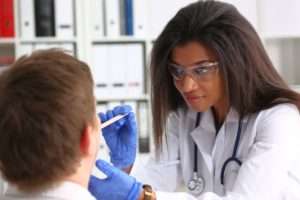The medical school journey is one of the most intense and rewarding experiences in life. It’s not easy, but it’s worth it.
If you’re considering a career in medicine, this post will give you an inside look at the medical school journey.
From my very earliest memory, I’ve wanted to become a doctor. I know, particularly when you’re from the Caribbean, many children were – or maybe still are – encouraged to become doctors, engineers or lawyers since these professions are often viewed as the highest forms of professional success.
Plus, being a doctor is also viewed as a respected, stable profession which has it’s financial rewards. However, for me, this was something I always wanted for myself and as cliché as it may sound it was because I had a genuine desire to help people.
The only thing is that I need to figure out how. Here’s a little information on some of the major life lessons from my medical school journey.
But, before we dive into that. There’s some information about medical school that you may find interesting:
According to this article by Kassebaum & Cutler (1998), the abuse of medical students is “ingrained” which contradicts the need for a more cultural sensitivity and professionalism. This includes belittlement, humiliation and mistreatment.
This practice ultimately creates a vicious cycle of abuse since the medical student may continue to mistreat patients and colleagues because they themselves were mistreated. In fact, the design and guidance of the curriculum that students receive throughout medical school are significant contributors to their attitude, values and behaviors.

"You can't get through medical school if you don't have a strong will and a strong constitution." - Ken Jeong
- The medical school journey is one of the most intense and rewarding experiences in life. It's not easy, but it's worth it.
- 1.Things are not always as they seem
- 2.Always be open to change
- 3.Yes, the medical school journey's hard
- 4.Unexpected treasures during the medical school journey
- Final words on medical school journey
- Life as a doctor
- What are the best leadership skills for success
Related: 16 proven ways to cope with difficult situations
1.Things are not always as they seem
Honestly, I wasn’t initially trilled of the idea to studying in Cuba. I guess I did have a biased perception initially – although I’m not sure from where or when it originated.
If I’m honest, it was probably always at the back of my mind and it was more of a preconceived idea rather than an actual impression.
As such, if there is something you want, the means to achieve it may not always be as you expect. Luckily that’s not always such a bad thing. Weigh your options and then just go for it.
I promise you won’t regret it. Remember that your blessings may come unexpectedly. Always be open to receive it.
Life lesson: Our misperceived perception may be a detriment to our own life and success. Carefully assess pros and cons before ruling things out.
2.Always be open to change
Life is constantly evolving. As such, being able to adapt and embrace change is a priceless skill. Adapting to a new country, food, lifestyle and language is definitely challenging.
However, this adaptation was the perfect opportunity for personal and professional growth.
Undeniably, I had my fair share of struggles. But, preparing myself mentally beforehand certainly did help.
It’s true what they say, for a better outcome ‘Expect the worse and hope for the best.’ Challenges often lead to even greater successes. The sooner we accept this, the better off I think we’d all be.

"The chapter you're learning today, is going to save someone's life tomorrow. Pay attention." - Khangal Weheartit
Life lesson: Change may be challenging but learning to adapt and never give up will open the door for infinite success.
3.Yes, the medical school journey’s hard
Medical school is hard, physically, mentally and emotionally. As you know, medical schools have highly competitive and rigorous academic programs that demand the best of its students. Essentially, the challenges, both academically and personally, are immense.
Notably, getting accepted to medicine is also quite tough. Of course, some places/countries are more competitive than others.
Additionally, the duration and type of training is often quite different from one university to the next. However, it is often quite challenging to have a job while in medical school.
And, it’s not just the studying, it’s the little or no days’ off, the stressful clinical rounds, countless rotations, frequent exams, missing birthdays and holidays.
It requires resilience, stamina, dedication and passion. Plus, medical school is quite long. For me, it was for seven long years.
However, this process is so necessary to set you up for life after medical school. These experiences and challenges are what prepares you for the pressures and sacrifices of working as a medical doctor.
Life lesson: Nothing worthwhile in life comes easily. Take it one step at a time and celebrate every small victory and milestone. Always remember why you began this journey in the first place.
Read more: 19 easy ways to increase your brain power
4.Unexpected treasures during the medical school journey
The medical school journey also has lots of treasures. You’ll form lifelong bonds and friendships. Also, you’ll be exposed to different cultures and customs and learn the value to community.
The best part of the medical school journey is that you don’t have to do it alone. You’ll learn the value to independence and interdependence.
I often remember the popular saying by Jose de Letamendi that we would hear over and over again “El médico que solo sabe medicina, ni siquiera medicina sabe” (Translated: The doctor that only knows medicine, does not event know medicine).
Indeed, there is so much wisdom in these words.
Knowledge of a person’s beliefs, traditions and culture, economic challenges and social norms etc. are necessary for comprehensively diagnosing and treating them. Further, being a doctor is not only about medicine, but it’s an art.
And, if you learn to perfect this skill, it will allow you to enrich and improve some else’s life in more ways that you could ever expect.

"Wherever the art of medicine is loved, there is also a love for humanity."
Life lesson: Many valuable lessons in life are learnt in a ‘journey’ so cherish each stage because it’s where you’ll find true treasure.
Final words on medical school journey
Medical school is comprised of many challenges and experiences. As such, if you’re considering medical school, make sure that it’s something that you truly want to do and that you’re not just doing it to live up to your parent’s dreams.
If not, you’re in for an even tougher ride.
Also, if you’re considering studying abroad, go for it! You only live once and what an awesome experience it is to experience a new country before launching into the world of work.
However, the best thing about being in medical school is that it’s never boring! The challenges of balancing academics, social life and the work/life balance are all real – but so are the rewards!
"Medicine is only for those who cannot imagine doing anything else." - Dr. Luanda Grazette
Discover 36 personality traits to become successful people
Share your thoughts below your medical school journey or experience studying abroad.
Life as a doctor
Being a doctor is hard work. You’ll have long hours, high stress, and the pressure of saving lives every day. But it also comes with some incredible rewards.
You’ll get to help when they’re most vulnerable and get the opportunity to make a difference in their lives.
But it’s not all about saving lives – doctors are also respected members of society who have an impact on how we live our daily lives. Read more
What are the best leadership skills for success
There are many factors that contribute to a person’s long-term success. Some of these include hard work, determination, and passion.
However, to be an inspirational leader, you must have certain essential skills. Read more
References
Kassebaum DG, Cutler ER. On the culture of student abuse in medical school. Academic Medicine : Journal of the Association of American Medical Colleges. 1998 Nov;73(11):1149-1158.
Rushana Greenidge-Horace










Leave a Reply